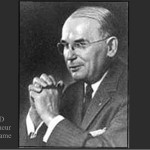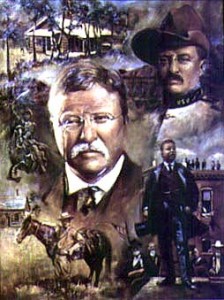BISMARCK, N.D. – Gov. Jack Dalrymple Thursday presented the North Dakota Theodore Roosevelt Rough Rider Award to the family of Herman Stern, a businessman and visionary who managed the Straus Clothing Store in Valley City for 70 years and made numerous contributions to the state, including founding the Greater North Dakota Association (GNDA), now known as the Greater North Dakota Chamber (GNDC), and establishing the North Dakota Winter Show. Stern, who passed away in 1980, is the 40th recipient of the award, the state’s highest commendation for its citizens.
“When we look back on our state’s history, the past century has been defined by milestones and developments that have laid a strong foundation for the growth and success of our state,” said Dalrymple, “and as we reflect on these significant accomplishments, some common themes emerge – themes that are personified by the name Herman Stern. His vision and values have become part of the fabric that makes our state what it is today, and many of the businesses and organizations that are making a difference in communities across our state are rooted in the beliefs, the ambition and the work ethic of this amazing man we honor today.”
Dalrymple presented the award during a luncheon at the Radisson Hotel in Fargo sponsored by the GNDC and attended by more than 150 family members, friends, colleagues and supporters. Stern was recognized for his contributions to the GNDC, the Boy Scouts of America and his sponsorship of more than 100 Jewish refugees during the 1930s.
Other speakers at the ceremony included GNDC President Andy Peterson, Justice Dale Sandstrom, Michel Stern, John Stern and Terry Shoptaugh, author of the book, “You Have Been Kind Enough to Assist Me”: Herman Stern and the Jewish Refugee Crisis. Secretary of State Al Jaeger and Historical Society of North Dakota Director Merl Paaverud assisted the Governor in unveiling the portrait of Stern that will hang in the state Capitol along with the other award recipients.
Stern was born in Oberbrechen, Germany in 1887, the youngest of eight children. He came to America at the age of 16 to work at the Straus Clothing Store in Casselton, a clothing store established by his cousin, Morris Straus. In 1907, Stern became manager of the store when a second store opened in Valley City. Three years later, Stern became manager of the Valley City store and remained there for the next 70 years.
In addition to Casselton and Valley City, the company operated stores in LaMoure, Carrington, Grand Forks, Jamestown and Devils Lake. Today, after more than 130 years of operation, Straus Clothing has a store in Fargo with a third generation of Stern family members running the business. John and Rick Stern have succeeded their father, Ed Stern, in running the family store.
In addition to his business contributions, Stern was also very active in community and statewide organizations and initiatives, establishing many programs that were pivotal in North Dakota’s progress, and remain so today. In 1924, Stern founded GNDA and served as the organization’s first president. He brought together state and local officials, as well as business
leaders, to establish the association and advance its first goal of implementing “an extensive advertising and publicity campaign for the better development of the state and its natural resources.” For 90 years, the association has carried out Stern’s founding visions and has been instrumental in promoting and advancing the state’s economic opportunities.
In 1937, under Stern’s vision and direction, the North Dakota Winter Show made its debut in Valley City. The show was established to promote North Dakota’s agriculture industry and feature the work of 4-H clubs, FFA groups and other ag-related organizations and businesses. After 77 years, the Winter Show is the oldest and longest running agriculture show in the state, drawing visitors and exhibitors from across the country and Canada. Stern chaired the fundraising campaign to raise money for the construction of the North Dakota Winter Show Event Center, the show’s home still today.
Stern was active with Boy Scouts of America and was instrumental in establishing councils in Fargo, Valley City, Wahpeton and Grand Forks, councils that later formed the Northern Lights Council. Stern held every position in Scouting and received many prestigious awards, including the Silver Buffalo, Boy Scouts’ highest award. He started a fundraising campaign to raise money to build a camp for Boy Scouts in northwestern Minnesota. Camp Wilderness is the Northern Lights Council’s 2,400-acre camp located near Park Rapids, Minn. that focuses on character building, citizenship training, and physical and mental fitness. Over the past several decades, hundreds of thousands of Boy Scouts from North Dakota and Minnesota have participated in the camp.
With family and friends in Germany during the rise of Adolf Hitler and the Nazi Party, Stern became worried about their welfare and embarked on a mission to bring them to America. He felt it was “just an accident that I came to this country” and he and his wife, Adeline, had the “responsibility to make it possible for other people to continue to live and have an opportunity to enjoy this great country of ours, which was so good to us.”
With assistance from state leaders and the U.S. State Department, Stern made it possible for more than 100 German Jews to escape the Holocaust and come to America. Each individual required a visa, a process that took weeks or months. Stern tracked each visa and contacted different agencies throughout the process to ensure the application was moving forward. He had to personally guarantee that none of the individuals would become wards of the state. In 1967, on Stern’s 70th birthday, several of those he helped bring to America honored him with a framed resolution of appreciation for his inspiring generosity. He was also honored by the Museum of Jewish Heritage in New York for his extraordinary deeds.
Stern was also active in Rotary and the Masonic Order, and was instrumental in establishing a program called the Community Chest, in which people would donate money to help address the needs of the community not funded by taxes. That program later became the United Way of Barnes County, another of Stern’s visions that is still impacting people today.
An honorary rank of Colonel in the Theodore Roosevelt Rough Riders was established during the 1961 Dakota Territory Centennial. The award recognizes present and former North Dakotans who have been influenced by the state in achieving national recognition in their fields of endeavor, thereby reflecting credit and honor upon North Dakota and its citizens.
More…
BISMARCK, N.D. (AP) – Herman Stern, a businessman and community leader who founded what is now the Greater North Dakota Chamber is the 40th recipient of the Theodore Roosevelt Rough Rider Award, the state’s highest honor.
Gov. Jack Dalrymple announced Wednesday that the award will be presented to the family of Stern, who died in 1980.
Stern came to North Dakota from Germany when he was 16 years old to work at Straus Clothing in Casselton, which was established by his cousin, Morris Straus. Stern would become manager of the Straus store in Valley City, where he remained 70 years.
In 1926, Stern founded the Greater North Dakota Association, now known as the GNDC, and served as the organization’s first president. He also was pivotal in starting the North Dakota Winter Show in Valley City.
From UND – Denter For Inovation – North Dakota Entrepreneur Hall of Fame:
 Herman Stern emigrated from Germany at 16 years of age to work for his cousin, M. G. Straus, in Casselton. The Straus Clothing store was founded in 1879. Stern moved to Valley City in 1911 for Straus, which later branched out to six stores across the state. Stern was the founder of many organizations including the Greater North Dakota Association (GNDA) in 1925, the North Dakota Winter Show in 1938, and the North Dakota Automobile Club (AAA) in 1940. In the 1930s he sponsored over 120 Jewish refugees fleeing Nazi Germany. Stern died in 1980 at age 92.
Herman Stern emigrated from Germany at 16 years of age to work for his cousin, M. G. Straus, in Casselton. The Straus Clothing store was founded in 1879. Stern moved to Valley City in 1911 for Straus, which later branched out to six stores across the state. Stern was the founder of many organizations including the Greater North Dakota Association (GNDA) in 1925, the North Dakota Winter Show in 1938, and the North Dakota Automobile Club (AAA) in 1940. In the 1930s he sponsored over 120 Jewish refugees fleeing Nazi Germany. Stern died in 1980 at age 92.













Comments are closed
Sorry, but you cannot leave a comment for this post.